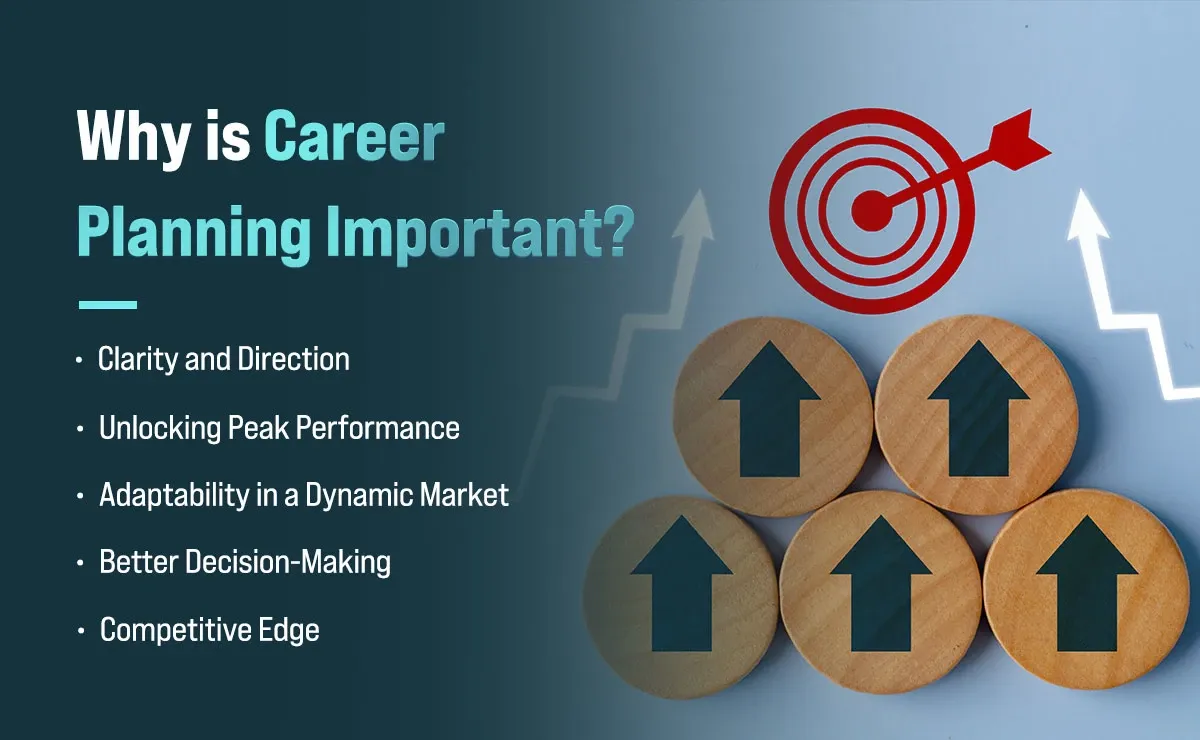What is Career Planning?

In this modern world of hectic schedules, where industries are changing rapidly and employment roles are evolving at an unprecedented pace, it is easy to find yourself without a clear direction in your career. This is where strategic career development comes into focus. Career planning is a lifelong process; it is not a one-time procedure that will help you align your personal goals and objectives with professional opportunities.
Career planning involves determining where you will be in the future in your professional life and developing an action plan to reach that goal.
For many working professionals, the next logical move is to build marketing skills that genuinely support their career growth. Altera Institute’s PGP in Marketing helps you do exactly that — with real industry exposure, hands-on learning, and dedicated placement support that turns your career goals into real progress.
This article unpacks what career planning is, why it matters, and how to build and sustain a plan that carries you from where you are today to where you want to be tomorrow.
Understanding Career Planning
Career planning is the strategic, step-by-step process through which individuals:
- Identify their unique strengths, interests, values, and personality traits.
- Explore career options that align with your self-insights.
- Set clear, realistic short-term and long-term objectives.
- Develop an actionable roadmap (education, skills, networking).
- Implement and review their progress toward those objectives.
Rather than relying on luck or chance encounters, career planning empowers individuals to take control of their futures, aligning personal talents with market opportunities and ensuring continuous growth. It encompasses every major career decision—what to study, which job roles to pursue, when to switch industries, or how to prepare for leadership positions.
Why is Career Planning Important?
Today, when job security is no longer guaranteed and lifelong employment with a single company is rare, career planning becomes essential for sustained success and satisfaction. Here are several reasons why it matters:

- Clarity and Direction: It lacks the focus and purpose of professionals who respond to opportunities intuitively, as opposed to responding intentionally. A clear career plan provides a map through which uncertain desires have been transformed into specific objectives, reducing confusion and the loss of energy.
- Unlocking Peak Performance: Regular self-assessment in career planning helps identify both skills and areas for improvement. This will help people to invest in appropriate skills, which translate to better performance and better employability.
- Adaptability in a Dynamic Market: Rapid technological advancements and shifting industry demands make today’s job market more volatile. Career planning encourages ongoing environmental scanning, helping you anticipate emerging skills, pivot when necessary, and avoid skills obsolescence.
- Better Decision-Making: Career planning offers an organized system for decision-making, whether it's evaluating a job opportunity or deciding on further education. Decisions become less intuitive and more conscious, in line with higher goals and values.
- Competitive Edge: Employers prize candidates who clearly articulate their career trajectories and demonstrate proactive development. A well-documented career plan demonstrates initiative, foresight, and a commitment to professional growth.

What are the Characteristics of Career Planning?
There are five features to effective career planning, and each has a specific role in making your dreams a plan:
Self-Assessment
Thorough self-assessment is the foundation of any career plan. It involves honestly evaluating your:
- Strengths & Weaknesses: List your technical (e.g., data analysis, coding, etc.) and interpersonal (e.g., communication, leadership) strengths.
- Interests & Passions: Identify the activities and things that you are the most interested in and that you would do even without a paycheck.
- Values & Priorities: Figure out what you can never compromise, whether it is work-life balance, creativity, or societal impact, to be able to find the role and the organization that would reflect your ethos.
- Personality Traits: Use assessment tools to know how you handle and interact with teams, how you deal with stress, and how you solve a problem.
Goal Setting
It is necessary to translate self-insights into progress using SMART goals, which should be specific, measurable, achievable, relevant, and time-bound. By defining a combination of short-term (3-6 months), medium-term (1-2 years), and long-term (3-5+ years) objectives, you:
- Maintain motivation through incremental wins (e.g., “Complete the Google Analytics course by July”).
- Relate every milestone to larger career goals (e.g., the data skills that will make one a marketing analyst).
- Foster accountability by attaching clear deadlines and success metrics.
Research
Good career choices are based on sound information. Research combines:
- Market Analysis: Research job boards, remuneration, and industry reports to provide an idea of the demand, pay patterns, and the qualifications needed.
- Company Insights: Get to know the organizational cultures, values, and path of growth through websites, Glassdoor reviews, and social media.
- First-Hand Perspectives: Shadow professionals, conduct informational interviews or attempt virtual job simulations to get the reality of the day-to-day of jobs you are considering.
Decision Making
With data available to you, you need to decide which course of action is most appropriate for your profile and situation. Successful decision making entails:
- Pros & Cons Mapping: Compare all options on major factors, such as their satisfaction potential, growth, and work-life balance.
- Feasibility Assessments: Consider that you may have financial, time, and resource limitations, such as the need for further training or relocation.
- Value Alignment: Be sure to take a path that will not compromise your values and long-term vision, and you will be less likely to regret or burn out in the future.
Action Plan
The last and most essential characteristic is a stepwise roadmap that splits SMART goals into tangible activities:
- Education & Skill Development: Enroll in classes, certifications, or degree programs that have definite schedules and clear financial plans.
- Practical Experience: Obtain internships, freelance or volunteer experience that would be relevant to your portfolio and credibility.
- Networking & Mentorship: Schedule regular informational interviews, attend industry events, and establish mentor check-ins to open doors and gain guidance.
- Job Search Strategy: Craft tailored resumes and cover letters, practice interview techniques, and track applications systematically.
What is the use of Career Planning in HRM?
In human resource management (HRM), career planning is a key linking point between personal career goals and organizational goals. This is the way HR departments can use career planning to achieve employee satisfaction and business performance:
Aligning Individual and Organizational Goals
HRM involves career-planning discussions during performance reviews and development plans to help employees achieve their personal goals, while also helping the company move in the right direction. For example, when an organization is focused on digital transformation, HR can encourage employees who want to upskill themselves in critical areas to achieve their career objectives, as well as address key talent shortages.
Identifying Training and Development Needs
In the context of career planning, HR gathers information on employees' long-term goals and their current skill set. Such data is used to inform a learning needs analysis, allowing HR to create a tailored training program, including in-house training, third-party certifications, or stretch assignments. This way, employees have ample scope to develop, and the organization can build a more powerful, future-oriented workforce.
Enhancing Employee Engagement and Retention
The employees are more motivated and committed when they realize that their organization is actively promoting their professional growth. As a way of demonstrating this commitment, HRM uses formal career planning tools, such as individual development plans (IDPs) and career-pathing workshops. Frequent progress reports and revised roadmaps will convey the message that you are a valued presence, leading to less turnover and increased morale.
Building Succession Pipelines
Career planning on an organizational level is expanded through succession planning. To understand who is ready or who can be ready with specific development to fill leadership positions, HR monitors the career plans of high-potential employees with role-critical competencies. This is a preventive strategy that reduces the likelihood of risk when key offices are vacant, preserving continuity.
Supporting Internal Mobility
HR enables employees to explore career changes or promotions, both vertically and horizontally within the organization, by keeping their career profiles up to date and making internal job openings visible. Career planning also motivates employees to explore different fields, and HR can align them with vacant positions that suit their expertise and ambitions, enabling talent to flow across the organization and reducing external hiring costs.
Measuring HR Effectiveness
Finally, HRM uses metrics from career-planning programs, including promotion rates, internal-hire ratios, training completion rates, and employee satisfaction scores, to evaluate the impact of its talent development efforts. These insights inform continuous improvements to both the career-planning process and broader HR strategies.
How to Develop a Career Planning Process?
A successful career planning initiative follows a six-step, iterative cycle:
- Self-Assessment: Understand your unique profile strengths, weaknesses, interests, values, and personality by using assessments and reflecting on past experiences to pinpoint careers that truly fit you.
- Goal Setting: Define clear SMART objectives that translate your self-insights into actionable milestones across short, medium, and long-term horizons.
- Career Exploration: Gather real-world data via job postings, industry reports, informational interviews, and shadowing to evaluate roles, companies, and growth prospects matching your profile.
- Decision Making: Compare your top options using a pros-and-cons matrix, feasibility checks, and value alignment to select the most promising and realistic career path.
- Action Planning: Develop a detailed roadmap that breaks SMART goals into tasks, such as education, skill-building, networking, and job search, assigned to specific deadlines for accountable progress.
- Implementation & Review: Execute tasks consistently, track milestone completion on a weekly and monthly basis, and periodically reassess and adapt your plan to reflect new insights and evolving goals.
What are the Benefits of Career Planning?
Here are the benefits of career planning:

- Enhanced Job Satisfaction: Aligning your work with passions and values leads to higher engagement and reduced burnout.
- Accelerated Growth: Systematic skill development and targeted experiences fast-track promotions and open doors to advanced roles.
- Monetary Growth: Pursuing certifications and jobs that can maximize returns on investment increases long-term revenue opportunities.
- Work–Life Harmony: Deliberate planning helps you negotiate schedules or choose roles that respect personal priorities.
- Resilience to Change: With a well-maintained plan, you are in a position to shift gears without any trouble when the industry changes, you are jobless, or your personal life changes.
- Stronger Professional Network: Frequent informational interviews and networking rituals expand your network of mentors, sponsors, and advocates, reinforcing it.
Summing Up
In a world where things are changing at an alarming rate and it seems like there is no limit, a systematic career planning process is your surest guide. You become the master of your own career rather than a passive recipient by basing your insights on rigorous self-assessment, translating them into SMART goals, researching practical alternatives, making a well-informed choice, and implementing an action plan.
For organizations, embedding these practices into HRM strengthens talent pipelines, boosts engagement, and aligns individual ambitions with strategic needs. Ultimately, career planning delivers clarity, adaptability, and lasting satisfaction: you gain the confidence to seize the right opportunities, steer through challenges, and continually grow in a career that reflects your unique strengths, values, and aspirations.





